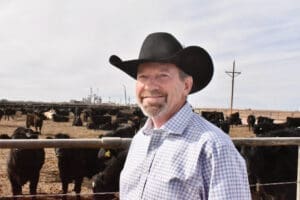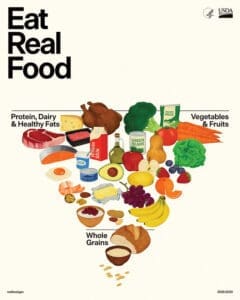A Key Link in 44 Farms, Prime Pursuits, Direct Supply Chain to Walmart
By Larry Stalcup, Contributing Editor
Warren White and Mc6 Cattle Feeders have always looked to expand their production and marketing. Their latest venture is a one-of-a-kind program to feed specific, non-hormone, nationally sourced cattle produced and harvested specifically for Walmart.
The world’s leading beef retailer, Walmart has developed its own supply chain for hormone-free Angus cattle that is fully transparent from the ranch to the packer. Along with Mc6, located in Hereford, Texas, other partners in Walmart’s supply chain endeavor include Creekstone Farms, rancher Bob McClaren of 44 Farms and Prime Pursuits in Cameron, Texas.
McClaren and White will help Walmart source cattle. After being finished at Mc6, the cattle will be harvested at the Creekstone packing facility in Arkansas City, Kan.
“This is a unique program because of the scope of who is involved – Walmart,” White says. “It’s a win-win for producers. There’s a chance we will see more retailers and branded programs doing something similar.”
White and Mc6 have been feeding all-natural cattle from 44 Farms genetics for several years. The new program takes further advantage of 44 Farms Angus genetics, as well as other Angus seedstock operators across the country.
“The Prime Pursuit brand will involve cattle produced in most of the western U.S.,” White says. “We’ll be sourcing cattle from Texas to North Dakota and nearly all states west to fill our need. I’m doing a lot more traveling now.”
Their hormone-free program is similar to the non-hormone treated cattle (NHTC) program for cattle marketed to the anti-hormone European Union. It goes against conventional feeding programs that include implants and growth promotants like beta-agonists. No MGA can be used in heifers. Judicious use of antibiotics is allowed.
“The program goes beyond an all-natural program,” White says. “All cattle must be in a PVP (process verified program). We are using IMI Global as the third-party auditor to assure cattle are source verified and non-hormone.”
In the program, cattle are selected and sorted from cow-calf operators, backgrounders and stocker operators. White says cattle will be brought in at about 850 pounds for steers and 775 pounds for heifers. Steers will be harvested at 1,350-1,400 pounds. Heifers will be harvested at 1,250-1,300.
“In a conventional feeding program, you buy cattle, feed them and sell them,” White says. “The challenge in this program is to procure cattle and place them at a consistent weight for the feedyard to make sure they finish at the weights needed by the packinghouse. Walmart says they want so many cattle a week and we must have them ready.”
There are steers and heifers on feed at Mc6 now. The plan is for the first cattle to be harvested this fall. They expect to be in full production the first quarter of 2020.
“We will eventually be feeding about half the cattle here and the other half at various feedyards in Nebraska,” says White, a native Nebraskan who has many connections with producers, feeders and auction markets there.
Scott Neal, senior vice president, Meat, Walmart U.S. announced the overall program in April. “As clean labels, traceability and transparency become more and more important to customers, we’ve made plans to enter into the beef industry, creating an unmatched system that allows us to deliver consistent quality and value,” he said.
“By enlisting a number of best-in-class companies to take part in the supply chain, we’ll be able to provide customers with unprecedented quality, provide transparency throughout the supply chain and leverage the earnings we gain across our business.”
Creekstone expects to add 250 jobs at the Arkansas City plant. The program will also add more than 200 jobs in Georgia, where Walmart owns a case-ready beef facility that will be run by FPL Food LLC, Augusta, Georgia. “As of now, all of the beef will be sold in about 500 stores in the Southeast,” White says.
He adds that 44 Farms and its genetics were what Walmart was looking for in its drive to obtain a consistent supply of premium beef. “Our arrangement with 44 Farms has been to feed natural cattle for their 44 Steaks program,” White says.
“In that program, as well as the Walmart program, if a ranch operator wants to tell his or her story, we encourage it. For several years the industry has indicated it’s important for producers to get their story out there. A 44 Farms tag line is ‘know your rancher.’
“At Mc6, we have a 55,000-head feeding capacity. These types of programs allow us to feed more cattle that we know have a direct end point.”
According to Neal, beef “is an important purchase for our customer. It’s likely the most expensive item on their plate and they are treating themselves when they buy it. Creating this supply chain allows us to treat our customers by giving them unprecedented quality and transparency.”
Hank McWhorter, whose father, Dan, established Mc6 Cattle Feeders, says Walmart’s “bold vision will not only elevate backyard barbeques and family dinner tables across the country but transform the entire supply chain.”
White says he continues to receive calls from ranchers across the country that want their cattle in the non-hormone program. “The interest is really growing,” he says, adding that the link to high quality beef is growing across the country.
“We even have ribeyes from 44 Farms on menu at our Hereford Country Club, ” he says, “and those diners there know a good steak.”





